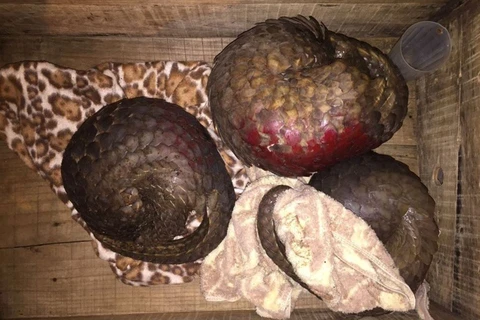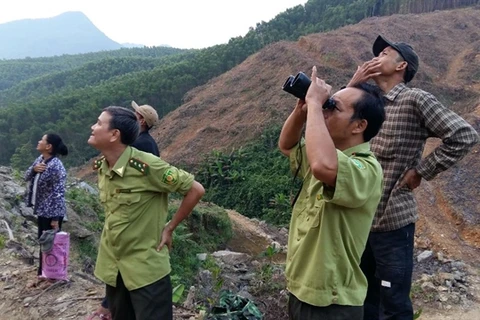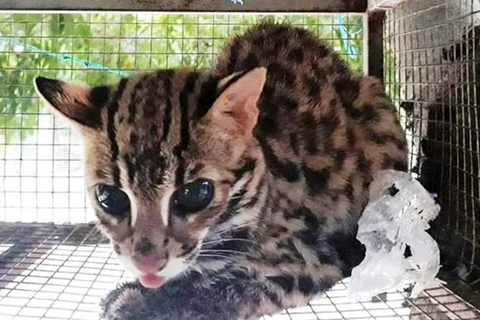 During the 2013-2017 period, about 1,500 violations on wildlife protection are detected and handled (Photo: VietnamPlus)
During the 2013-2017 period, about 1,500 violations on wildlife protection are detected and handled (Photo: VietnamPlus) Hanoi (VNA) – To prevent the spread of the novel coronavirus SARS-CoV-2 that causes COVID-19, conservationists proposed abolishing “black markets” for wildlife trade and blaming authorities of localities where violations happen.
According to researches, about 70 percent of infectious diseases transmittable from animals to humans originate from the wildlife. The acute respiratory disease caused by the novel coronavirus SARS-CoV-2 will surely take its toll on Vietnam.
Ministries, sectors and environmental non-profit organizations (NPOs) cannot stay negligent and have asked to local authorities to step up inspections and proposed the Prime Minister to adopt measures in a bid to tackle threats from illegal wildlife trade.
Despite concerns over the ravaging disease as well as authorities’ instructions and suggestions, at many wildlife trafficking and consumption hotspots nationwide, notably Thanh Hoa wet market in the Mekong Delta province of Long An, the trading of animals in Vietnam’s Red Book is still going on as usual.
Trinh Le Nguyen, Director of the Vietnamese non-governmental organisation People and Nature Reconciliation (PanNature), explained the issue further in an interview with e-newspaper VietnamPlus.
PanNature is among 14 environmental NPOs that recently submitted a letter and seven actions to PM Nguyen Xuan Phuc to close down the wildlife market and in an effort to prevent COVID-19.
Many wildlife trafficking black markets still exist
Reporter: What are your assessments of the trading of animals in Vietnam Red Book in recent years, especially amid the ravaging COVID-19?
Trinh Le Nguyen: Wildlife trading in Vietnam has been on the rise and become more complicated.
Data released by the Environmental Impact Assessment (EIA) in 2019 showed that in the past 15 years, among wildlife violations discovered in or related to Vietnam, there were at least 105.72 tonnes of tusks of about 16,000 elephants, 1.69 tonnes of horns of an estimated 610 rhinos, along with skin and bones of at least 228 tigers, and bodies and scales of 65,510 pangolins.
Earlier, statistics of the Wildlife Conservation Society Vietnam and the crime and information technology statistic office showed that that during the 2013-2017 period, some 1,504 violations were discovered, stopped and handled, seizing over 41,320 kg of animals while 1,461 people were arrested and 432 were brought to trial.
As COVID-19 wreaked havoc in many countries and territories, Vietnamese relevant agencies have ordered local authorities to tighten inspections and control wildlife trade and consumption.
The recognisation of threats from wildlife trade, especially the possibility of transmitting diseases from wild animals to humans, is viewed a warning to society and individuals who intend to consume wildlife products.
This is a chance for countries to review, amend and enforce regulations on wildlife conservation and prevent illegal trading activities.
[Ministry warns of risks posed by illegal wildlife trading, consumption]
However, many wildlife trade hotspots still exist nationwide, some even offering endangered, valuable and rare animals in need of protection. In addition, restaurants serving dishes of wild animals are operating stealthily, with their supply being maintained.
Reports from the media and some conservation organisations showed that many wildlife farms now serve as camouflages to legalise wildlife hunting and trade.
Reporter: Why have illegal wildlife trade hotspots across the country, including decade-old markets like Thanh Hoa in Long An, yet to be demolished?
Trinh Le Nguyen: First of all, it has been caused by the lack of sense of responsibility of local authorities, which resulted in inadequate guidance and inspections. Compliance to regulations serves as a foundation for tackling wildlife trade.
Evidence from the media unveiled that sometimes violators are protected by the authorities. It is alarming that even after being reported, the authorities did not thoroughly handle the cases and cover up for each other.
In Long An, local authorities and agencies showed an unusual neglectfulness about the existence of a wildlife market, in spite of repeated reports from people and the media.
Clearly assigning responsibility and tasks
Reporter: What are solutions to put an end to wildlife trade?
Trinh Le Nguyen: In out letter sent to the PM, we put forward measures to close down illegal wildlife trade markets as well restrict relevant acts.
The Government needs to show its determination and order local authorities and agencies to fulfil their tasks. They have to bear responsibility for violations happening in their localities.
[Caged life kills species in Vietnam’s Red Data Book]
Meanwhile, relevant agencies need to revise the policy to raise wild animals. Facilities taking advantage of this policy to involving in wildlife trade and consumption must be closed and strictly handled.
Reporter: What mechanisms do we need to monitor and collaborate between agencies to prevent wildlife trade?
Trinh Le Nguyen: Cooperation between agencies is among aspects which need to be improved. The Ministry of Agriculture and Rural Development and the Ministry of Natural Resources and Environment can issue joint documents or provide couselling to ensure consistency and collaboration between agencies.
Reporter: How will conservation NPOs take part in the fight against wildlife trade in Vietnam?
Trinh Le Nguyen: Vietnamese and international NPOs have worked together with relevant agencies to raise capacity, bolster research, carry out initiatives and contribute to policy building, among others.
In the coming time, we will continue those activities and join hands with the Government to implement, keep an eye on and assist efforts to put an end to wildlife trade and consumption in Vietnam.
Thank you so much!./.


























